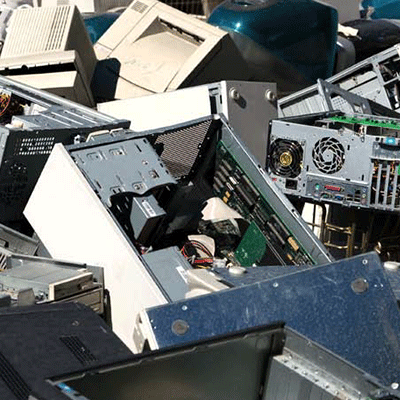 It’s a sobering visual: the total volume of electronic scrap generated worldwide between 2010 and 2025 will cover one square mile to a height of 268 feet—a quantity roughly equivalent to the area of New York City’s Central Park and the height of the Brooklyn Bridge—and weigh about 70 million tons, based on Pike Research’s estimates published in the firm’s 2011 report, Electronics Recycling and E-Waste Issues.
It’s a sobering visual: the total volume of electronic scrap generated worldwide between 2010 and 2025 will cover one square mile to a height of 268 feet—a quantity roughly equivalent to the area of New York City’s Central Park and the height of the Brooklyn Bridge—and weigh about 70 million tons, based on Pike Research’s estimates published in the firm’s 2011 report, Electronics Recycling and E-Waste Issues.
This potential massive volume—coupled with an awareness of the possible human health and environmental consequences of improperly handled e-waste—has prompted corporations and lawmakers to act. Companies have adopted global sustainability initiatives and legislators around the world have crafted, or are in the process of crafting, regulations intended to protect people and the planet by establishing guidelines that define the responsible collection, reuse, and recycling of discarded electrical and electronic devices.
Emerging Regulations
Pike Research predicts that new regulations targeting the handling of e-waste along with a rise in the number of certified electronics recyclers will increase the amount of recycled e-waste from 18 percent to 54 percent between 2010 and 2025. These regulations and expanded recycling capacity could conceivably boost electronics reuse and recycling from 1.1 million tons to 7.9 million tons annually, according to the firm’s analysis.
But before those impressive reuse and recycling numbers can be achieved, there is work to do. “The international regulatory landscape is evolving rapidly and laws vary substantially from country to country. These variations make it very difficult for manufacturers and recyclers to stay informed about—and meet the requirements of—the latest laws in force in the countries where they do business,” said Renee St. Denis, vice president, business development, Sims Recycling Solutions, Americas. “Manufacturers often don’t have the resources available to figure out what every country legally requires of them.”
Contributing to the challenge of responsibly recycling e-waste is the limited availability of in-country recycling partners that can support the needs of global companies. “In order to make shredding services available, there needs to be capital investment. In order to make capital investment feasible, there needs to be volume,” said St. Denis. “Many jurisdictions in South American and African countries recognize that individually they aren’t processing waste electronics in large enough volumes to attract capital investment, but if they band together they can establish regional recycling centers. The work Sims is doing right now involves trying to forge these connections.”
Emerging Markets
Despite the unsettled nature of international electronics recycling regulations and the shortage of recyclers in some regions of the world, the pressure is on for electronics manufacturers to be compliant. “Manufacturers want to be part of a system that ensures the responsible collection and recycling of their products in each country where they do business, otherwise they may be barred from selling their products in those countries,” said St. Denis.
The reason for this eagerness is simple: These emerging markets, including Latin America and India, represent some of the best opportunities for growth due to product saturation in the North American, Western European, and Japanese markets, according to International Data Corporation analysts.
- F. Hornbeck’s 2011 Congressional Research Service report, U.S.–Latin America Trade: Recent Trends and Policy Issues, recognized that while “Latin America is far from the largest U.S. regional trade partner, it is historically the fastest growing one. Between 1998 and 2009, total U.S. merchandise trade (exports plus imports) with Latin
America grew by 82 percent compared to 72 percent for Asia.”
No Compromises
Gaps in a take-back and recycling network can also hinder a manufacturer’s bid to obtain EPEAT registration for their products. EPEAT requires that manufacturers meet its product and battery take-back and recycling criteria in all countries where it intends to register products, though this requirement can be satisfied through different methods—mail-in, drop off, or collection, for instance—in different countries.
The EPEAT standard also requires that recycling services conform to the U.S. Environmental Protection Agency’s Plug-In to eCycling Guidelines for Materials Management. The EPEAT product verification committee has determined that eight recycling certifications and systems are functionally equivalent to the EPA’s Plug-In Guidelines at this time:
- e-Stewards
- R2
- ECOLOGIC (France)
- EPSC’s RQP (2010) (Canada only)
- EfbV (Germany)
- SENS (Switzerland)
- SWICO (Switzerland)
- Stiftung Licht Recycling Schweiz (Switzerland)
Certification programs regulate the environmental, worker health and safety, information destruction, and transportation standards by which certified recyclers must operate. The certification process requires recyclers to demonstrate to an accredited, independent third-party auditor that they meet specific criteria to responsibly recycle electronics. Once certified, electronics recyclers must continuously prove—through audits and other means—that they meet rigorous environmental and safety benchmarks when handling and processing used electronics.
The regulations may vary from country to country, and even from state to state within a country, but the tenets that serve as the foundation for responsible electronics reuse and recycling—protection of human health and safety and the environment, responsible management of potentially toxic materials, and the legal trade of all end-of-life electronic devices—do not. Under these circumstances, it is even more important to conduct on-site audits and perform due diligence to know the capabilities of a recycler and the standards to which they operate.
“Everyone is very interested in legislation and there are a lot of discussions taking place right now,” said St. Denis. “It’s going to be interesting to see what happens.”
This article first appeared in The EPEAT Beat newsletter.
